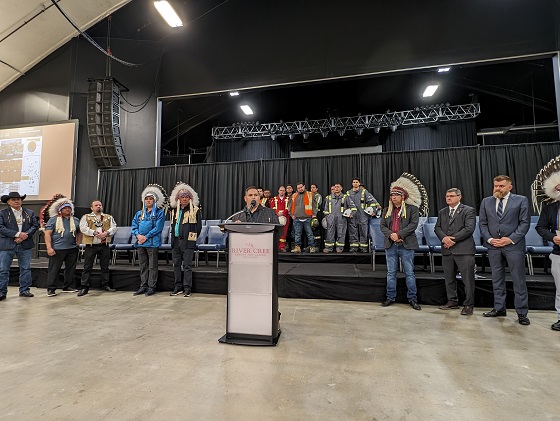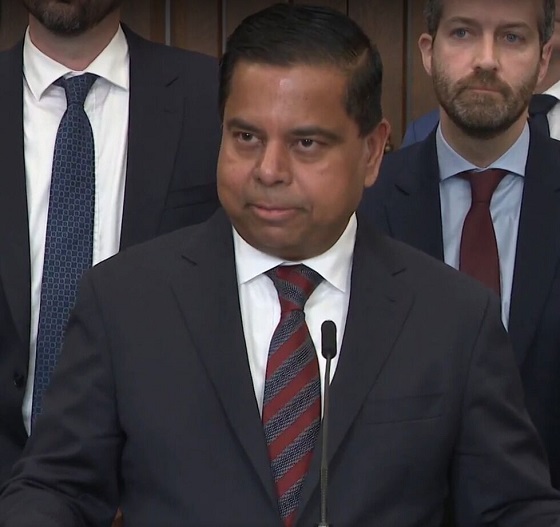Alberta
Alberta Chiefs demand Ottawa return funding for orphan well clean up

News release from Dennis Burnside, VP & Indigenous Practice Lead, Political Intelligence
Alberta Chiefs and the IRC call on Federal Government to fulfill its environmental obligations and commitments by releasing funding to First Nations
Government of Canada seeking to return $135 million in previously committed funding to federal coffers to use as savings, instead of empowering First Nations to clean up inactive and orphan wells on their lands.
ENOCH CREE NATION, AB, March 11, 2024
Chief Cody Thomas, Enoch Cree Nation, Chief Roy Whitney, Tsuut’ina Nation, and Chief Ivan Sawan, Loon River First Nation, joined with Chiefs from across Alberta today to call on the Federal Government to release unspent funding committed to the Site Rehabilitation Program (SRP) – approximately $135 million –to be utilized by Indigenous people to reclaim additional inactive and orphan wells on their lands. These funds are still in Alberta, but Ottawa is demanding them back.
On December 12, 2023, Chiefs from Treaty 6, Treaty 7, and Treaty 8 territories wrote to Minister Jonathan Wilkinson appealing to the federal government to allow the government of Alberta to place unspent SRP monies into the FNSR Program, providing much needed funding to continue the successful work that has been accomplished by First Nations, for First Nations. Without these funds, governments and industry would be leaving over 2,000 sites to be abandoned or reclaimed on First Nations lands and territories.
Chief Thomas stated: “We still have many inactive wells on our lands that need to be reclaimed properly; we estimate nearly 2,000 sites which will cost over $225 million. We acknowledge the work that has been done under the SRP but there is more to be done. This is a liability of the lessees, and the Alberta Government is holding them accountable through the Well Closure Program. However, time is not on our side. We have a very limited land base and a growing population. We must do the necessary land stewardship immediately”.
Chief Ivan Sawan stated: “Many Alberta First Nations have felt the greatest impacts of natural resource developments which have swept through our lands and ancestral territories for generations, leaving behind environmental wreckage, while being deprived of the opportunity to meaningfully participate or benefit. We are calling on the federal government to do the right thing and release these funds for the environmental and economic purposes they were intended, so that First Nations can create meaningful job opportunities, clean up our lands, and create a healthier and more prosperous future for our people.”
Chief Roy Whitney stated: “Too many oil and gas companies have simply walked away from their obligation to remediate their well sites on First Nation Lands. The SRP was a way for First Nations to have abandoned sites reclaimed. Accordingly, it was with great disappointment when we learned that the Federal Government was not going to release the remaining funds for the SRP. We fully support the request for the remaining funds being held to be released to continue the work to clean up our Lands.”
Under the previous Alberta Site Rehabilitation Program (ASRP) $130 million was allocated to 32 Alberta First Nations and Metis communities to clean up 2,145 sites. First Nations were able to abandon 988 wells and 411 km of pipelines as well as complete 793 reclamations while working on 4,188 projects. The result was a reduction of over $123 million in liability on reserves in Alberta while creating jobs, business development and training, and improving Indigenous community engagement and capacity.
The Indian Resource Council, an advocacy group that negotiated the set aside funding for First Nations, has detailed data on inactive and orphan wells on Indigenous lands. Stephen Buffalo, President and CEO of the IRC stated that the Federal regulator, IOGC, dropped the ball by failing to hold companies liable for their liabilities. He stated that First Nations can no longer depend on IOGC to get this work done.
Mr. Buffalo added: “Under Alberta’s SRP program, the government allocated more than $130 million for cleanup projects for First Nations and the Metis. So, we are doing what we can to keep that program going to maintain the success of the initial FNSRP. About 350 community members received jobs and skills training. By removing the aging wells and pipelines we can free up land to use for housing and other purposes” This is why we need the surplus funds.

A sign, from Alberta’s Orphan Well Association (OWA), identifies a non-producing and abandoned oil well near Carseland, Alberta on Sunday, July 21, 2019. Orphan wells do not have parties responsible for decommissioning or reclamation activities. THE CANADIAN PRESS IMAGES/Larry MacDougal
When SRP funding was earmarked to support Indigenous-led projects in 2021, it was celebrated that this was an area where the federal and provincial governments were in “perfect alignment”. This spirit of collaboration was good news for the environment, for Canada’s fight against climate change, and for First Nations. Alberta Chiefs are continuing to call on the federal government to rekindle this spirit of collaboration, however, Minister Wilkinson has recently stated that the federal government has “no plans to provide additional funding for the clean-
up of inactive and orphan wells.”
Alberta
Alberta’s grand bargain with Canada includes a new pipeline to Prince Rupert

From Resource Now
Alberta renews call for West Coast oil pipeline amid shifting federal, geopolitical dynamics.
Just six months ago, talk of resurrecting some version of the Northern Gateway pipeline would have been unthinkable. But with the election of Donald Trump in the U.S. and Mark Carney in Canada, it’s now thinkable.
In fact, Alberta Premier Danielle Smith seems to be making Northern Gateway 2.0 a top priority and a condition for Alberta staying within the Canadian confederation and supporting Mark Carney’s vision of making Canada an Energy superpower. Thanks to Donald Trump threatening Canadian sovereignty and its economy, there has been a noticeable zeitgeist shift in Canada. There is growing support for the idea of leveraging Canada’s natural resources and diversifying export markets to make it less vulnerable to an unpredictable southern neighbour.
“I think the world has changed dramatically since Donald Trump got elected in November,” Smith said at a keynote address Wednesday at the Global Energy Show Canada in Calgary. “I think that’s changed the national conversation.” Smith said she has been encouraged by the tack Carney has taken since being elected Prime Minister, and hopes to see real action from Ottawa in the coming months to address what Smith said is serious encumbrances to Alberta’s oil sector, including Bill C-69, an oil and gas emissions cap and a West Coast tanker oil ban. “I’m going to give him some time to work with us and I’m going to be optimistic,” Smith said. Removing the West Coast moratorium on oil tankers would be the first step needed to building a new oil pipeline line from Alberta to Prince Rupert. “We cannot build a pipeline to the west coast if there is a tanker ban,” Smith said. The next step would be getting First Nations on board. “Indigenous peoples have been shut out of the energy economy for generations, and we are now putting them at the heart of it,” Smith said.
Alberta currently produces about 4.3 million barrels of oil per day. Had the Northern Gateway, Keystone XL and Energy East pipelines been built, Alberta could now be producing and exporting an additional 2.5 million barrels of oil per day. The original Northern Gateway Pipeline — killed outright by the Justin Trudeau government — would have terminated in Kitimat. Smith is now talking about a pipeline that would terminate in Prince Rupert. This may obviate some of the concerns that Kitimat posed with oil tankers negotiating Douglas Channel, and their potential impacts on the marine environment.
One of the biggest hurdles to a pipeline to Prince Rupert may be B.C. Premier David Eby. The B.C. NDP government has a history of opposing oil pipelines with tooth and nail. Asked in a fireside chat by Peter Mansbridge how she would get around the B.C. problem, Smith confidently said: “I’ll convince David Eby.”
“I’m sensitive to the issues that were raised before,” she added. One of those concerns was emissions. But the Alberta government and oil industry has struck a grand bargain with Ottawa: pipelines for emissions abatement through carbon capture and storage.
The industry and government propose multi-billion investments in CCUS. The Pathways Alliance project alone represents an investment of $10 to $20 billion. Smith noted that there is no economic value in pumping CO2 underground. It only becomes economically viable if the tradeoff is greater production and export capacity for Alberta oil. “If you couple it with a million-barrel-per-day pipeline, well that allows you $20 billion worth of revenue year after year,” she said. “All of a sudden a $20 billion cost to have to decarbonize, it looks a lot more attractive when you have a new source of revenue.” When asked about the Prince Rupert pipeline proposal, Eby has responded that there is currently no proponent, and that it is therefore a bridge to cross when there is actually a proposal. “I think what I’ve heard Premier Eby say is that there is no project and no proponent,” Smith said. “Well, that’s my job. There will be soon. “We’re working very hard on being able to get industry players to realize this time may be different.” “We’re working on getting a proponent and route.”
At a number of sessions during the conference, Mansbridge has repeatedly asked speakers about the Alberta secession movement, and whether it might scare off investment capital. Alberta has been using the threat of secession as a threat if Ottawa does not address some of the province’s long-standing grievances. Smith said she hopes Carney takes it seriously. “I hope the prime minister doesn’t want to test it,” Smith said during a scrum with reporters. “I take it seriously. I have never seen separatist sentiment be as high as it is now. “I’ve also seen it dissipate when Ottawa addresses the concerns Alberta has.” She added that, if Carney wants a true nation-building project to fast-track, she can’t think of a better one than a new West Coast pipeline. “I can’t imagine that there will be another project on the national list that will generate as much revenue, as much GDP, as many high paying jobs as a bitumen pipeline to the coast.”
Alberta
Alberta Premier Danielle Smith Discusses Moving Energy Forward at the Global Energy Show in Calgary

From Energy Now
At the energy conference in Calgary, Alberta Premier Danielle Smith pressed the case for building infrastructure to move provincial products to international markets, via a transportation and energy corridor to British Columbia.
“The anchor tenant for this corridor must be a 42-inch pipeline, moving one million incremental barrels of oil to those global markets. And we can’t stop there,” she told the audience.
The premier reiterated her support for new pipelines north to Grays Bay in Nunavut, east to Churchill, Man., and potentially a new version of Energy East.
The discussion comes as Prime Minister Mark Carney and his government are assembling a list of major projects of national interest to fast-track for approval.
Carney has also pledged to establish a major project review office that would issue decisions within two years, instead of five.
-

 Business21 hours ago
Business21 hours agoCarney’s European pivot could quietly reshape Canada’s sovereignty
-

 Alberta20 hours ago
Alberta20 hours agoAlberta’s grand bargain with Canada includes a new pipeline to Prince Rupert
-

 Crime1 day ago
Crime1 day agoManhunt on for suspect in shooting deaths of Minnesota House speaker, husband
-

 Bruce Dowbiggin5 hours ago
Bruce Dowbiggin5 hours agoWOKE NBA Stars Seems Natural For CDN Advertisers. Why Won’t They Bite?
-

 Crime5 hours ago
Crime5 hours agoMinnesota shooter arrested after 48-hour manhunt
-

 Energy5 hours ago
Energy5 hours agoCould the G7 Summit in Alberta be a historic moment for Canadian energy?
-

 Aristotle Foundation3 hours ago
Aristotle Foundation3 hours agoThe Canadian Medical Association’s inexplicable stance on pediatric gender medicine
-

 conflict6 hours ago
conflict6 hours ago“Evacuate”: Netanyahu Warns Tehran as Israel Expands Strikes on Iran’s Military Command



